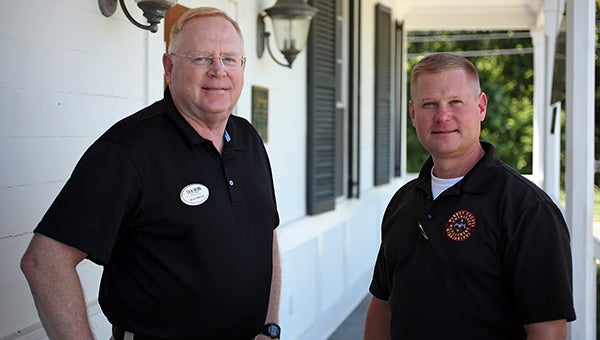Vets: Katrina ‘like a war zone’
Published 11:14 am Friday, August 28, 2015

- Rick Martin, left, and John Elfer served in the Mississippi Army National Guard on the Gulf Coast during Hurricane Katrina. (Justin Sellers/The Vicksburg Post)
Martin, Elfer recall being a part of the Guard’s response along state’s devastated Gulf Coast
Rick Martin and John Elfer thought their mission to Harrison County in late August 2005 might last three days, but it turned into a grueling six weeks with conditions worse than either of the two National Guardsmen had seen in combat zones.
The morning after they arrived, Hurricane Katrina made landfall, changing Mississippi, the nation and these two men forever.
“It was worse than we had seen in Iraq. We had seen places bombed out, but this was on American soil and here in Mississippi. That’s what made it really bad,” Martin said.
Elfer said the aftermath of the storm resembled the post-apocalyptic world depicted on the AMC series “The Walking Dead,” which details survivors of a zombie outbreak in Georgia.
“There were injured people everywhere. People were walking around in shock. I think people were in disbelief,” Elfer said. “I knew it was going to be bad, but I had no idea it was that catastrophic.”
Both men returned from Iraq in February 2004 after a yearlong deployment with the 31st Rear Operations Center of the Mississippi National Guard in 2003. At the time, Martin was chief of operations for Vicksburg National Military Park, and Elfer was a Warren County deputy.
Martin, a native of New York, had never been through a hurricane.
“The only experience I had was with Tropical Storm Dennis. We called it Hurricane Buffet because we ate at all the buffets while we were down there,” Martin said.
As they were riding together south on U.S. 49 at Hattiesburg, they noticed they were in the only vehicle headed toward the coast. Everyone else was fleeing the storm.
“We had no idea what we were in store for. We thought we’d be down there maybe three or four days. We got down there on the 28th of August and did not come back until October. We lived in the Harrison County courthouse until October,” Elfer said.
The same day, Mathew Brogdon of Vicksburg was caught up in that long line of traffic Martin and Elfer passed. He was a student at the University of Southern Mississippi but had been called in for active duty with the Vicksburg-based 168th Engineer Brigade.
“What would have been a two hour drive turned into five hours,” Brodgen said.
The next morning, the 168th deployed.
Inside the Harrison County emergency operations center, Martin, Elfer and the other men of the 31st Rear Operations Center had no view of the storm. Heavy iron shutters kept Katrina’s destruction out of sight at first. Men and women who had survived Hurricane Camille showed signs of stress and worry, Elfer said. A few wrote their social security numbers on their chests in case the building was swept away in the storm surge.
“It was obvious by the sounds and the atmosphere of the people who were there this was a tremendous storm,” Elfer said.
Brogden and members of the 168th were on U.S. 49 South when they met Katrina’s destructive path.
“We had to stop several times and cut our way through,” he said.
The storm wiped out infrastructure, leaving behind no electricity, running water or sewer system. Destruction to buildings was immense.
“It was like someone took a bunch of toothpicks and threw them down. There was a casino sitting in the middle of U.S. 90,” Elfer said.
Members of the 168th were in the thick of cleaning up the destruction. They worked out of Gulfport, Pass Christian and “what was left of Bay St. Louis,” Brogdan said.
He remembers seeing an elderly woman sitting on a pile of rubble that had once been her home.
“Imagine any kind of post-apocalyptic movie you’ve seen where everything was torn up,” he said of the destruction.
Emergency responders who were unfamiliar with the area had trouble finding their way around.
“There were no landmarks. You couldn’t recognize anything,” Martin said, adding he had visited Gulfport on vacation the June before the storm.
For the next six weeks, the logistical unit coordinated rescue efforts, searched for the missing and protected hospitals.
Some good did come out of the storm rife with sorrow, death, destruction and hopelessness.
“We got to see a lot of inspirational moments with a lot of people working together,” Elfer said.
Both Martin and Elfer took the spirits of cooperation and inspiration back to work with them. Before Martin retired from VNMP, he led an effort to get the park to work more closely with emergency services.
Elfer used his expertise to gain a new position with the county.
“We still apply lessons learned from that storm to the way we operate today,” said Elfer, who is now the county’s emergency manager. “That one historic event that I was a part of really was a life-changer for me.”
And in the past decade, the coast has rebuilt.
“I think we’ve come back from it. I’ve been down there since them. A lot of places you’d never even know,” Brogden said. “Louisiana and New Orleans get a lot of the attention, but Mississippi bore a lot of the storm. Going down there now shows what we can come back from.”





